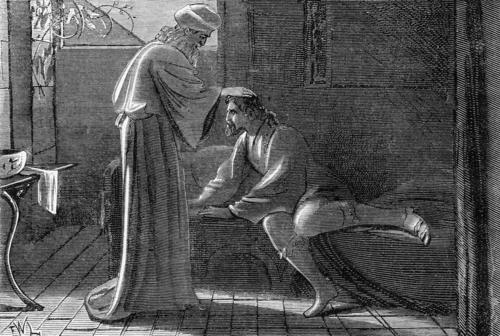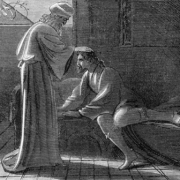Wenn aus Druck und Schmerz etwas Gutes entsteht
/0 Comments/in Wöchentliche Andacht/by David GuzikSaulus aber hatte seiner Ermordung zugestimmt. Und an jenem Tag erhob sich eine große Verfolgung gegen die Gemeinde in Jerusalem, und alle zerstreuten sich in die Gebiete von Judäa und Samaria, ausgenommen die Apostel. (Apostelgeschichte 8,1)
Wenige Verse zuvor lernten wir den Mann kennen, der die Hinrichtung von Stephanus, dem ersten Märtyrer des christlichen Glaubens, überwachte (Apostelgeschichte 7,58). In Apostelgeschichte 8,1 wird die Geschichte von Saulus fortgesetzt, wobei wir zunächst erfahren, dass Saulus dem Tod von Stephanus zustimmte. Die deutsche Übersetzung ist wahrscheinlich nicht deutlich genug. Der Gedanke hinter dem altgriechischen Wort suneudokeo ist “gutheißen, zufrieden sein mit”. Manche Menschen beteiligen sich nur widerwillig an der Verfolgung anderer, aber Saulus gehörte nicht dazu; er hatte Freude daran, Christen anzugreifen und sogar zu töten.

Saulus von Tarsus – den die meisten von uns unter seinem römischen Namen Paulus kennen – bedauerte diese Verfolgung der Gemeinde später zutiefst. Später schrieb er, „ich bin der geringste von den Aposteln, der ich nicht wert bin, ein Apostel zu heißen, weil ich die Gemeinde Gottes verfolgt habe“ (1. Korinther 15,9).
Der Tod von Stephanus war nur der Anfang, der Beginn einer großen Verfolgung, die sich gegen die Gemeinde richtete. Die Schleusen der Gewalt gegen die Christen waren nun geöffnet worden, und Saulus war nur einer von vielen Verfolgern. Zuvor waren einzelne Apostel verhaftet, geschlagen und verfolgt worden. Jetzt musste jeder Gläubige befürchten Gewalt zu erfahren, oder sogar umgebracht zu werden.
Im Jahr 1956 ermordeten Eingeborene am Ufer eines Flusses im Dschungel von Ecuador fünf Missionare, die gekommen waren, um ihnen von Jesus zu erzählen. Für viele schien dieser Tod eine sinnlose Tragödie zu sein. Viele sahen nur die fünf jungen Missionare, deren berufliche Laufbahn früh beendet wurde, oder die fünf Witwen und vaterlosen Kinder. Aber Gott hat durch diese fünf Männer sogar in ihrem Tod noch ein erstaunliches Werk vollbracht, und der Segen hallte noch lange in Menschen wie Elisabeth Elliot – der Witwe eines der Märtyrermissionare – nach.
In ähnlicher Weise mag auch der Tod von Stephanus auf den ersten Blick sinnlos erscheinen. Sein noch junges Leben, und sein energischer und wortgewandter Einsatz für die Gemeinde wurde abrupt beendet. Sein Dienst schien gescheitert zu sein – niemand wurde unmittelbar zum Glauben gebracht, und alles, was dabei herauskam, war noch mehr Verfolgung. Doch wie so oft wurde das Blut der Märtyrer zum Samen der Gemeinde.
Danach wurden sie über alle benachbarten Gebiete verstreut. Nun waren die Christen gezwungen, das zu tun, was sie bisher nur zögerlich getan hatten – die Botschaft Jesu in die umliegenden Regionen zu tragen. In Apostelgeschichte 1,8 sagte Jesus seinen Nachfolgern deutlich, dass sie über Jerusalem hinausschauen und das Evangelium nach Judäa, Samarien und in die ganze Welt bringen sollten. Bis zu diesem Zeitpunkt hatten die Nachfolger Jesu dies nicht getan.
Das Gute, was daraus hervorging zeigt uns, dass Gott schmerzhafte und drängende Umstände nutzen kann und wird, um sein Volk so zu führen, wie es seinem Willen entspricht. Manchmal müssen wir aus unserem Zustand, in dem wir es uns bequem gemacht haben, herausgerüttelt werden, bevor wir das tun, was Gott von uns will. Wenn Gott es zulässt, dass wir aufgerüttelt werden, dass wir unter Druck geraten oder dass wir Schmerzen erleiden, dann vergiss bitte nicht, nach dem Sinn seines Tuns zu suchen. Es könnte etwas sein, was viel größer ist, als Du es je Dir hättest träumen lassen.
What We Do – A Simple Description
/0 Comments/in For Pastors, Preachers, Bible Teachers/by David GuzikYour year-end generosity to Enduring Word is appreciated. Click here to donate.
Dear Pastor, Preacher, or Bible Teacher –
I hope this email reaches you as you enjoy some refreshment and restoring after a weekend of serving God, His people, and a needy world. Those of us who serve in this way know the rhythm of pouring out, and then having our “cup” filled up again by God through the many ways He chooses to do that.
Here’s a quick thought for you from Acts 22:
Then he said, “The God of our fathers has chosen you
that you should know His will, and see the Just One,
and hear the voice of His mouth.” (Acts 22:14)
In this passage, Paul remembered words spoken to him by Ananias, in the few days after his dramatic encounter with Jesus on the road to Damascus.

I like this verse as a short statement describing our duty before God:
- To know His will. God wants everyone to know His will, and to do it!
- To see the Just One. God wants everyone to have a personal, growing relationship with Jesus Christ.
- To hear the voice of His mouth. God wants everyone to hear His word.
Think of how this applies to the work God has given you as one of His messengers. With God’s help, you can help others to know the will of God. You can lead them into a real and deepening relationship with Jesus Christ. You can help others to hear and understand God’s word.
Ask God to make you a true “Acts 22:14” preacher or teacher!
Blessings to you in Jesus’ Name – David Guzik
Click Here to Receive Email from David for Pastors, Preachers, and Bible Teachers
The Successful Persecutor
/0 Comments/in Weekly Devotional/by David GuzikYour year-end generosity to Enduring Word is appreciated. Click here to donate.
As for Saul, he made havoc of the church, entering every house, and dragging off men and women, committing them to prison. Therefore those who were scattered went everywhere preaching the word.(Acts 8:3-4)
These verses from Acts 8 tell us what kind of persecutor Saul was.
Saul was an intense persecutor. The phrase “he made havoc” uses an ancient Greek word that could refer to an army destroying a city or a wild animal tearing at its meat. He hated the Christian faith so much that he viciously attacked the followers of Jesus. The verb tense in this phrase tells us that he did this continually.

Saul was an energetic persecutor. He did his work door to door, entering every house where Christians were suspected. He worked tirelessly to destroy the followers of Jesus.
Saul persecuted every suspected Christian, including men and women. Saul didn’t think, “it’s ok if the women are followers of Jesus – I’ll just focus on the men.” Saul felt that every disciple of Jesus Christ was worthy of punishment and some of them were worthy of death.
Saul followed through on his persecution, making sure that the Christians he discovered were committed to prison. It wasn’t enough to simply arrest them; they had to remain in a place where they couldn’t live out the Christian life.
As terrible as this was, I see something wonderful here. The way Saul persecuted Christians was like a mirror image of how, after his repentance and conversion, he loved. Of course, this man Saul is more commonly remembered by his Roman name – Paul.
– Once Paul was intense in his hatred – he became intense in his love.
– Once Paul was energetic to persecute – he became energetic to bring the good news of Jesus Christ.
– Once Paul persecuted every suspected Christian – he became an energetic messenger of God’s salvation to everyone who would hear it.
– Once Paul followed through on his persecution – he became a man who followed through with those who responded to the good news of Jesus, leading people to become true disciples of the Messiah.
We once served sin and self these ways. Now, it’s time for us to honor God with the same intensity and energy we once gave to sin and self.
Even though Saul was a successful persecutor of the followers of Jesus, God even used that in His plan. We read, those who were scattered went everywhere preaching the word. The result was for the glory of God because the persecution simply served to spread the message. We shouldn’t think that those who left Jerusalem left as formal preachers. Most were “accidental missionaries” who talked about Jesus wherever they went.
We can be just like these early Christians. We can share the good news of what Jesus has done in our lives. Most people don’t come to Jesus through a professional preacher or an evangelist; they come to Jesus through people just like us.
Even Saul’s “success” at persecution just advanced God’s plan.




